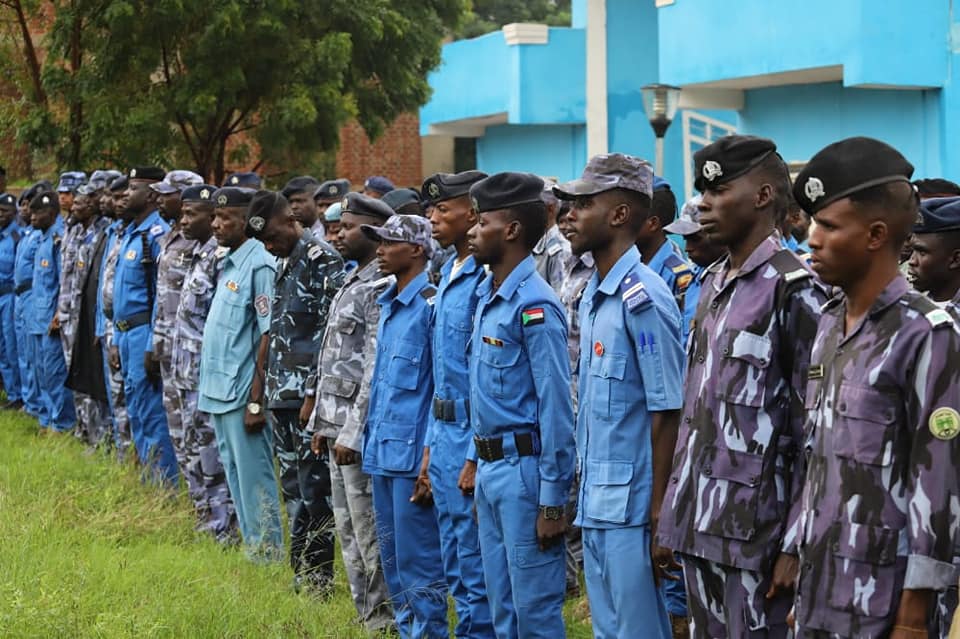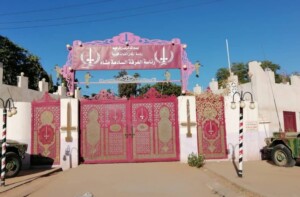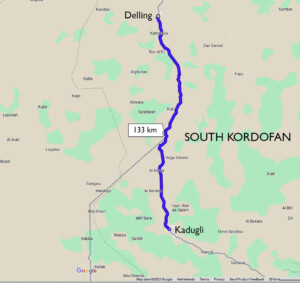Rapid Support Forces ‘to set up federal police force in Sudan’

Various Sudanese police forces lining up in Darfur (File photo: Darfur Network for Monitoring and Documentation)
The Rapid Support Forces (RSF) is working on the establishment of a ‘federal police force’ in the country’. The force is supposed to start operating in Khartoum soon. In RSF-controlled West, Central, South, and East Darfur, hundreds of police officers have returned to their job.
An RSF source told Radio Dabanga yesterday that the new federal police system will first be established in the capital Khartoum “these days, and then move to the rest of the states”.
Radio Dabanga obtained a document ordering the formation of a committee to set up a federal police force, as well as a letter addressed to RSF Commander Mohamed ‘Hemedti’ Dagalo in which he is requested to approve the formation of the committee.
According to the document, the police officers, some of whom are in service, and others retired, who form the committee, are entrusted with the tasks of recruiting police officers, police agents, and technicians for the new federal police.
The RSF are in control of most of Darfur, several areas in Kordofan, and a large part of Khartoum state. The eastern, northern, and central parts of the country are in control of the army – though a small RSF convoy entered the Butana plains in eastern Sudan’s El Gedaref, as reported by Sudan War Monitor last week.
Back to work
In November, hundreds of Sudanese police officers returned to carry out their work in West, Central, South, and East Darfur, which are controlled by the RSF, Radio Dabanga correspondent Abdelmonim Madibbo reported yesterday.
After RSF paramilitaries had taken control of Nyala, South Darfur, in late October, RSF deputy commander Abdelrahim Dagalo assigned a police chief and officers in the city. After the fall of Zalingei to the RSF, a pro-RSF police major named assumed command of the police in Central Darfur, as happened earlier in El Geneina in West Darfur. As for Ed Daein, capital of East Darfur, the police did not stop their work after the outbreak of war, but rather received dozens of police officers from South Darfur after the outbreak of battles in Nyala.
A police officer told Radio Dabanga from Nyala earlier this month, where 217 of a force of 500 policemen returned to their job under RSF control, said that they responded to “the call of the nation and to the people’s need for legal services provided by the police, in cooperation with the RSF”.
Businessman and former head of the Chamber of Commerce in South Darfur, Mohamed El Tom, believes that “the return of some police agents to work in Nyala does not say much in light of the absence of the rest of the pillars of justice.
“Managing a city of the size of Nyala requires the presence of strong, well paid police forces plus an effective judiciary to guarantee the security, safety, and confidence of the citizen,” he stated.
‘High treason’
A police officer in El Geneina who is nearing his retirement however said that he is waiting for directives from the Sudanese Police Command “regarding our return to work.” He does not dare to join the police cooperating with the RSF because “I have spent my life in the police and cannot risk my entitlements when retired”.
Another police officer, in North Darfur, which is the only Darfur state where the capital is not controlled by the RSF, however condemned the police forces that returned to work in the states controlled by the RSF. “They are considered a rebel force,” he told Radio Dabanga.
Sudan’s police chief has instructed all police forces in RSF- occupied states to move to states under control of the Sudan Armed Forces (SAF) and join police offices there.
“According to the directives of the Director General of Police, those working in areas controlled by the RSF are considered rebels. They will be dismissed from service without any rights and will be tried on charges of high treason for violating the Sudanese Police Law,” he explained.
“In response to these directives, most of the police agents from Nyala joined the White Nile state police, while others joined the police in East Darfur before it fell to the RSF. As for the policemen in Zalingei and El Geneina, several of them sought refuge with their families in camps for the displaced, others moved to North Darfur.”
‘Lucrative conditions’
The police captain, who preferred to withhold his name, further said that “the RSF, after taking control of four Darfur states, worked hard to persuade those displaced by the violence in the region, to return to their homes.
“They called for the cleaning of neighbourhoods, the reopening of markets and hospitals, after these four states witnessed a security chaos because of widespread killings, robberies, plundering, and kidnappings, often committed by RSF members themselves,” he continued.
“Therefore, the RSF commanders saw that the only way to impose security was the return of the police. They began to recruit existing and new policemen and promised them lucrative conditions and good salaries.
“The commanders did succeed in attracting new personnel,” he added. “Especially among the tribes that support the RSF.”
Local efforts in Khartoum
In response to the absence of policemen in Khartoum, civilians have set up a system to combat the many robberies, burglaries, and other crimes in the city, economic analyst Hafez El Zein told Radio Dabanga.
He explained that this system “has nothing to do with the RSF plans for a federal police force. “A large group of administrative officers, engineers, legal officers, and pensioners from the police forces have set up this system, which consists of three levels: a council of notables, as an alternative to the legislative councils, an executive administration, which includes professional administrative officers, and a security committee, which includes veterans from the police, army, and security forces who have declared their loyalty to the RSF.”
The analyst stressed, however, that “this local justice system was developed by civilians and has nothing to do with the RSF”, citing what “RSF Commander Hemedti repeated several times, namely that the RSF does not want to rule, but it is a military force responsible for the provision of security in coordination with the authorities present in the area in question”.











 and then
and then